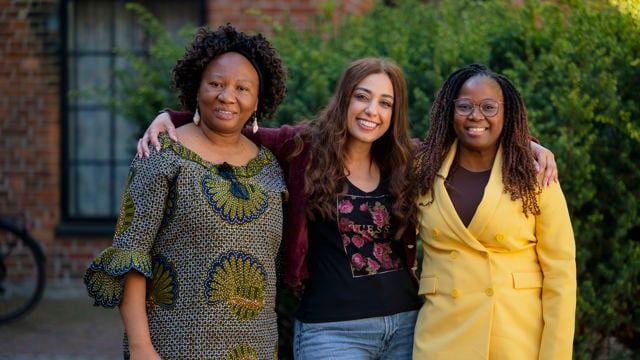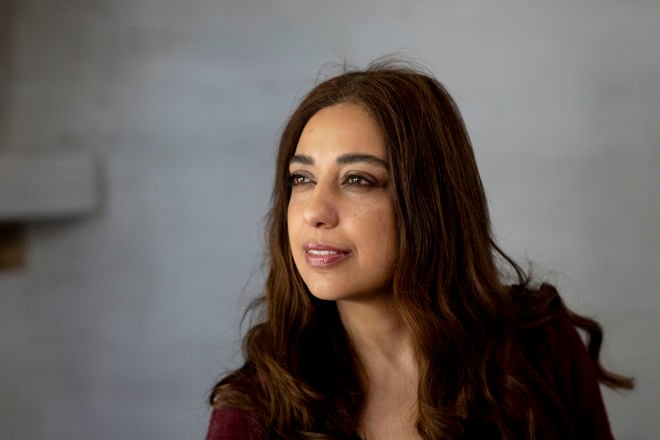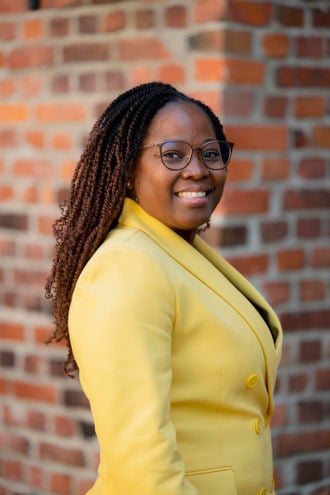– Women are not a problem to be solved, we are actors of change and peace

From the left: Claudine Tsongo Mbalamya, Dynamique des Femmes Juristes (Democratic Republic of the Congo), Khouloud AlKhatib, Executive Director of LOUDER (Lebanon), and Egna Rachel Isaias Idumo, PhD candidate at CMI (Norway/Mozambique)
This spring, leaders, activists and scientists gathered in Oslo to mark the 25th anniversary of UN SC Resolution 1325 – a milestone in the work on the right of women to participate in peace processes. Among them were three defenders of human rights.
The law as a weapon for justice
– It is always important to include woman in peace processes. Because it’s their right, and they deserve it, says Claudine Tsongo Mbalamya.
She has worked for more than 15 years as a lawyer and human rights advocate in Congo, a country where women have had to fight against structural discrimination, sexual violence and marginalisation for generations. Despite this they have been courageous and driven, and have worked for peace in their communities.

Claudine Tsongo Mbalamya: Lawyer and human rights activist. With a solid background in gender and peacebuilding, she has more than 15 years’ experience from women-led civil society organisations. She co-founded and is the coordinator of Dynamique des Femmes Juristes (DFJ), where she oversees more than 21 legal clinics that handle around 2,000 sexual and gender-based violence (SGBV) cases annually.
– I was born in a conflict zone, and I have had to fight for my place. Women are paying a high price in conflicts. They are raped, killed and violated in different ways. To achieve lasting peace, we must recognise women’s experiences and expertise. My fight is for the next generation. I want to show them that it is possible to raise their voices, says Mbalamya.
Women must be the architects in peace processes
Khouloud AlKhatib grew up in Lebanon and holds a PhD in international law. She is an expert in human rights and has extensive experience from the Middle East and North Africa.

Khouloud AlKhatib is a co-founder and the president of LOUDER. With a PhD in international law, she is a leading expert on human rights and the UN’s protection mechanisms.
– We must transform our societies from conflict to prosperity, from war to peace. We cannot achieve this without women playing a central role in peace negotiations. Women should be the architects of peace, says AlKhatib.
At the same time, she is concerned about the growing challenges the world faces – from prolonged conflicts to threats to democratic values and fundamental rights.
– All the challenges we have now with the democratic backsliding are threatening the woman rights movement. It is crucial that women are an active part of the solution. It’s the time to keep leading, she stresses.
A key role in peacebuilding
– Conflicts are often understood from a male perspective. When women are involved, peace processes become more inclusive, says Egna Rachel Isaias.
As a research fellow at the Christian Michelsen Institute (CMI), she has devoted her career to documenting and strengthening the role of women in reconstruction and peace work.
Isaias grew up in Mozambique, a country characterised by political turmoil, riots and violent conflict in the north. Many of the country’s citizens also have painful memories of a brutal 17-year civil war. In her fieldwork, she has researched how community relations with police affect security in conflict areas, and how gender-conscious conflict analysis can produce more effective strategies.

Egna Rachel Isaias is a research fellow at CMI, focusing on conflict, peacebuilding and the role of women in reconstruction in Mozambique.
Globally, scientists and activists have long argued that peace processes become more sustainable when women are active participants in them. This is also the message of Lisa Sivertsen, who heads Norad’s Department for Welfare and Human Rights.
– Women make up half of the world’s population. Women must participate in peace processes. And women must be included in what comes after peace, when societies are being rebuilt. Women must have a seat at the table, women must have positions of power, and the perspectives of both women and men must be included when rebuilding peace after a conflict, says Sivertsen.
The work of Egna Rachel Isaias, Khouloud AlKhatib and Claudine Tsongo Mbalamya is part of this movement, which puts women’s rights at the heart of peacebuilding.